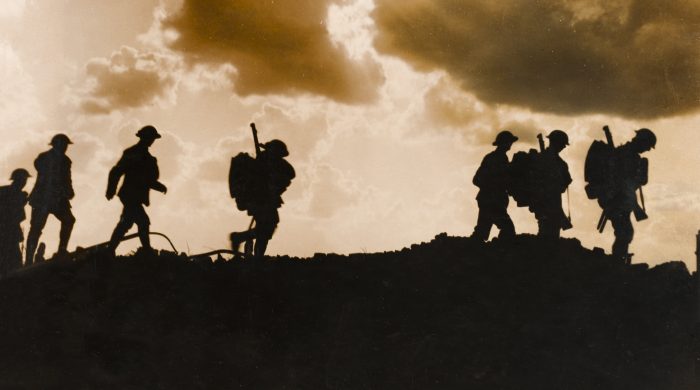The kids had ‘World War I day’ in school last week, to mark the centenary of the armistice of 1918. The teachers arrived in Edwardian costume, and the kids were dressed in old-fashioned clothes, or dressed as nurses or soldiers.
Most of the boys came dressed as soldiers and, inevitably, some shooting games ensued. The teachers even re-created the disciplinarian teaching techniques of the past, and the kids had to walk straight, sit in rows, and write on slates, instead of working on iPads.
It was all good fun for the kids, but when you’re that age, the events of a century ago seem impossibly remote in time. That evening, I was determined to give the kids a sense of the tragedy, and the sheer human waste of that conflict.
I first told them of their great-great grandfather on their mother’s side who served in the Royal Navy during that war. I then told them of their other great-great grandfather who served in North Africa in the Italian army, and contracted malaria there and relapsed all his life. They listened, vaguely interested, but it all seemed very distant. I might as well have been speaking of Roman times.
Pipe
I told them that my grandfather, who I knew well when I was at their very age, was born in 1897. He had lived through the time of the Great War. I told them how I remembered, like yesterday, sitting on his sofa as he smoked his pipe, as he told me of his first cousin Michael O’Neil, who died just six days before the war ended. Now, they were rapt.
Michael lived next door to my granddad’s farmhouse in Durrus, West Cork. He fought through the First World War, and was awarded the Military Medal in 1918, after the Battle of Passchendaele. I remember granddad saying he got a medal for taking out an enemy machine gun post, armed only with a shovel. He was sent home wounded at the war’s end, and had just arrived back in his parents’ farmhouse in Durrus, before dying there, aged 35. He is buried in a military grave in the local graveyard.
He had an interesting story, despite his short life. He had a liaison with a girl in England while on leave during the war. I got in touch with his (resulting) descendant who lives in London a few years ago. He told me that Michael joined the Grenadier Guards in England in 1904. After three years soldiering, he joined the Yorkshire Police, in Bridlington. It was said that he was the only constable who would go into the rougher pubs in the old town to break up a fight on his own, sometimes emerging dragging out one miscreant in each hand.
Reservist
In 1911, he went to Western Australia, where one of his brothers lived at the time. The family story is that they were prospecting for gold. As he was still a reservist in 1914, when war broke out, he was called up from Australia and sailed back arriving in France on January 12, 1915. He saw some of the worst battles of the war in the following years, before being wounded by a gunshot to the left shoulder in autumn 1918.
He was shipped back to England, wounded, on October 24, 1918. He then struggled back home to Cork, getting sick on the way, and arrived in the station in Bantry, on a night of torrential rain, walking miles home to the cottage he was born in, where he died in the company of his parents 100 years ago on November 5 last.
The thought that I knew someone who had known someone killed in the war impacted the kids – as did the fact that he died, wounded, at home with his parents, in the very house where he had lived and played as a child, at their age. They now had a tangible connection to that awful orgy of destruction, and to a member of our own family who was caught up in it.
It was no longer shooting games, and funny clothes, but a wound that afflicted every family in Europe, including ours. A psychic wound that shattered the faith of Europe, in God and in itself. A wound which has not yet healed.


 Rory Fitzgerald
Rory Fitzgerald
